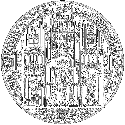|
|
notes |
video |
| Chap 1 |
Stochastic processes |
|
|
| §01 |
Examples |
VL01 |
|
| §02 |
Review / reminder |
|
|
| §03 |
Probability measures on Polish spaces |
VL02 |
|
| §04 |
Adapted stochastic process and stopping time |
VL03 |
|
| §05 |
Martingale theory |
VL04
VL05 |
|
| §06 |
Weak convergence |
VL06
VL07 |
|
| Chap 2 |
Stochastic differential equations |
|
|
| §07 |
Existence of Brownian motion |
VL08 |
|
| §08 |
Donsker's theorem |
|
|
| §09 |
Markov properties of the Brownian motion |
VL09 |
|
| §10 |
The Itô integral |
VL10
VL11 |
|
| §11 |
Itô processes |
VL12
VL13 |
|
| §12 |
Stochastic differential equations |
VL14 |
|
| §13 |
Martingal representation |
VL15
VL16 |
VL16
|
| Chap 3 |
Ergodic theory |
|
|
| §14 |
Stationary and ergodic processes |
VL17 |
|
| §15 |
Ergodic theorems |
VL18 |
|
| Chap 4 |
Empirical processes |
|
|
| §16 |
Empirical and partial sums processes |
VL19 |
|
| §17 |
Uniform laws of large numbers |
VL20 |
|
| §18 |
Symmetrisation |
|
|
| §19 |
Univariate exponential inequalities |
|
|
| §20 |
Set indexed empirical processes |
VL21 |
|
| §21 |
Laws of large numbers |
VL22 |
|
| §22 |
Talagrand's inequality |
VL23
VL24 |
|
|
|
|
|

